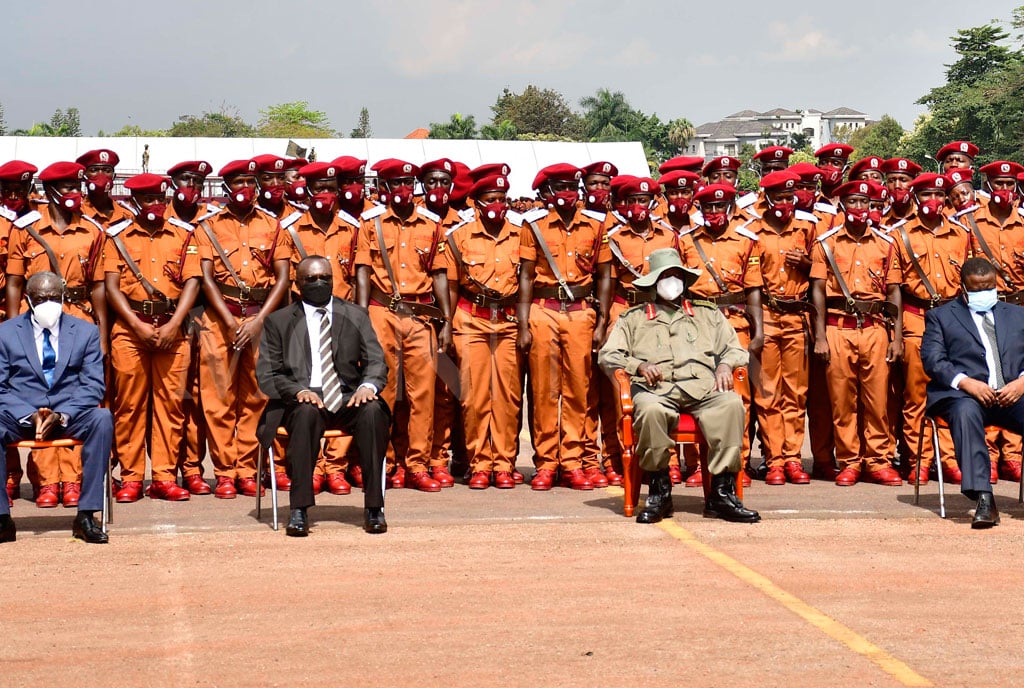Implement digital number plates project, says Museveni

President Museveni (centre) is flanked by left to right: Amb Joseph Ocwet, the director general of External Security Organisation; Chief Justice Alphose Owiny-Dollo, Internal Affairs minister Gen Kahinda Otafire, and Dr Johnson Byababashaija, the commissioner general of Prisons, after the passing out of 2,234 Prisons officers at the Kololo Independence Grounds on September 10, 2023. PHOT0/STEPHEN OTAGE
What you need to know:
- President Museveni says the digital number plates will help in tracking criminals because most people move to and from the scene of crime using either a motor vehicle or a motorcycle.
President Museveni has insisted that the electronic motor vehicle number plate venture must go on, but the disagreements among the government agencies that are part of the project should be resolved.
President Museveni said the digital number plate would be a force multiplier in his effort to fight crime in the country.
“Now, I am insisting on the electronic number plates. That will be a very big blow to crime because most people move to and from the scene of crime by either a motor vehicle or a boda boda (motorcycle). If we close that gap, it will be very difficult for the criminals to do what they are doing because walking to and from the crime scene isn’t easy, especially if you want to escape. And you are also seen by the cameras. The cameras will see you. I want that gap to be closed and all these arguments should come down and be done quietly and resolved,” President Museveni said.
The digital number plate project will be managed by a Russian company, Joint Stock Company Global Security. It is part of the country’s Intelligent Transport Monitoring System (ITMS) meant to increase efficiency in the sectors of transport and security in the country.
The project was expected to start in mid this year, but it was postponed due to delays on the contractor’s side. It is slated to start in November this year where motor vehicles will be required to replace the old number plates to digital ones at a rate of Shs150,000 for motor vehicles and Shs50,000 for motorcycles.
However, several government ministries and agencies that are supposed to coordinate with each other on the execution of the project are at loggerheads about implementation of its objectives.
While appearing before a parliamentary committee last month, the Minister of Internal Affairs, Maj Gen (rtd) Kahinda Otafiire, said he wasn’t privy to the details of how the digital number plate project will work.
Project view
Maj Gen Otafiire doubted that the project would work with hindrances given the fact that the Russian company has to produce the digital number plates in Poland, which is currently at loggerheads with Russia over the invasion of Ukraine.
He said the team that carried out due diligence about the Russian company in Russia found that no similar project had been implemented in any country and Uganda would be the first.
The Members of Parliament also expressed worry that data collected on the movement of Ugandans might end up in wrong hands or misused by government officials to harass their opponents.
The Russian company had installed computers at the police CCTV command centre to be able to access data that would enable them make the project effective, but Maj Gen Otafiire directed the police to switch them off since it affected the government’s contract with the Chinese company, Huawei that installed the CCTV cameras.
President Museveni has since met the Huawei leaders at State House, but the details of their meeting were not revealed.
ALSO READ: Car tracking deal runs into trouble
The Uganda Revenue Authority Commissioner General, Mr John Musinguzi, also told the Parliament committee that the Shs714,000 for a number plate would be too costly for the ordinary motor vehicle taxpayer to afford.
Mr Musinguzi said the tax collectors had not been briefed about how the shares each party would get from the number plates.





